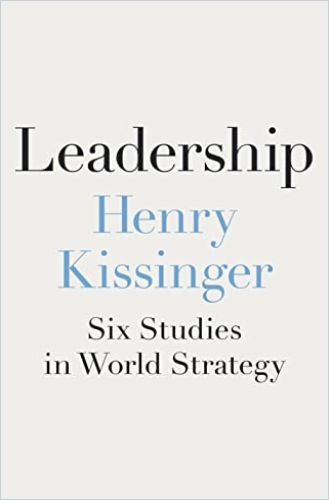In his final, ambitious tome, the larger-than-life Henry Kissinger distills his views on leadership and strategy through the lens of six eminent 20th-century politicians.

Realpolitik Leadership
The controversial statesman and strategist brings an unfathomable depth of global experience at the highest levels of political power. Kissinger accumulated his vast knowledge and networks over a career spanning 70 years. He espouses his view of commendable leadership in his valedictory work, published at age 99.
Realpolitik in action
Kissinger profiles six political leaders who rose to power during World War II and the geopolitical landscape left in its wake. He highlights politicians who demonstrated his view of fortitude and strategic insight. He includes biographical sketches of German Chancellor Konrad Adenauer, French President Charles de Gaulle, US President Richard Nixon, Egyptian President Anwar Sadat, Singaporean Prime Minister Lee Kuan Yew, and British Prime Minister Margaret Thatcher.
Great leadership is more than an evocation of transitory exultation; it requires the capacity to inspire and sustain vision over time. Henry Kissinger
Kissinger argues that exceptional leadership is more crucial now than ever if dominant powers hope to overcome challenges, avoid decline, and save the planet from environmental catastrophe. He believes the politicians he outlines exhibited leadership acumen: strategic vision, historical knowledge, and courage to act in the face of adversity and opposition.
Konrad Adenauer
Kissinger begins his leadership profiles with German Chancellor Konrad Adenauer, who, at significant personal risk, opposed Adolf Hitler during WW II. Adenauer became the first chancellor of post-WW II Germany in 1949, committing himself to reinventing a liberal state.
According to Kissinger, Adenauer’s ability to balance humility with a decisive will to rebuild Germany after the war saved the country and possibly Europe. He admires Adenauer’s capacity to balance appeasing the Allies with promoting Germans’ national hopes, gradually regaining international trust and concessions through firm diplomacy.
Kissinger also points to Adenauer’s diplomatic skills in accepting responsibility for German atrocities and his resolute resistance to the Soviets. By the end of his 14-year term in 1963, Adenauer had reshaped German culture and, in so doing, created a trusted European and NATO partner, as well as an economic powerhouse.
Charles de Gaulle
Kissinger evokes the celebrated charisma of Charles de Gaulle, the leader of “Free France,” who helped revive the country’s confidence and pride; Kissinger admires de Gaulle’s tough diplomacy during and after WW II.
De Gaulle’s leadership was not an elaboration of a historical process but a unique expression of a personality and of a special set of principles. Henry Kissinger
He lauds de Gaulle’s ability to make his voice heard among the Allies, even while influencing from a position of weakness during the war. De Gaulle, from exile in London, established himself as a popular and credible leader.
Kissinger is impressed by de Gaulle’s ability to defend France’s interests, guaranteeing its post-war self-determination. While serving as president for the second time from 1958 to 1968, de Gaulle restored France to its global leadership position and helped the West deflect the Soviets.
Richard Nixon
Kissinger served as a close confidant to Richard Nixon during his presidency from 1969 to 1974, working as national defense adviser and secretary of state. He rates Nixon’s international policy vision among the most impactful in modern history. Kissinger makes a case for Nixon’s successes in Europe, the Middle East, and East Asia, including withdrawing many US troops from Vietnam, resisting Soviet expansionism, and initiating China’s entry into the modern world.
Anwar Sadat
Kissinger next focuses on Anwar Sadat, one of modern history’s greatest proponents of peace. Following his rise to the Egyptian presidency in 1970, Sadat backed away from Soviet ties to pursue peace with the West, expelling Soviet advisers in 1972. Kissinger explains Sadat’s surprise attack on Israel in 1973 as an effort to strengthen Egypt’s negotiating position during peace talks.
Sadat envisioned Egypt as a peaceful Islamic nation, strong enough to partner with its erstwhile enemy rather than either dominating it or being dominated by it. Henry Kissinger
Kissinger cites Sadat’s unprecedented 1977 visit to Israel, which led to peace agreements at Camp David in 1978. However, Sadat’s historic achievements were undone by opposition and pressure from other Arab states, according to Kissinger, leading to his assassination in 1981. Despite his tragic death, Sadat’s legacy of positioning Egypt as a bridge between East and West persists.
Lee Kuan Yew
Kissinger stands in awe of Lee Kuan Yew, the father of modern Singapore. He argues that Yew’s vision and relentless commitment to excellence turned a tiny, resource-impoverished peninsula into one of the world’s most prosperous countries.
Lee’s statesmanship illustrates that the best determinant of a society’s fate is neither its material wealth nor other conventional measures of power but rather the quality of its people and the vision of its leaders. Henry Kissinger
During his tenure as prime minister from 1959 to 1990, Lee united disparate populations into a multi-ethnic society grounded in patriotism, service and excellence. Lee invested in education, welcomed foreigners into the workplace, and supported US involvement in Vietnam. According to Kissinger, he achieved continuity and left a lasting legacy.
Margaret Thatcher
Finally, Kissinger extols the determination and unyielding certainty of Margaret Thatcher, Britain’s prime minister from 1979 to 1990. He reminds readers that Thatcher’s rise to power was unlikely and her situation, once elected, precarious. Yet, he argues controversially, she returned a “sick” Britain to prominence through free market principles, smaller government and economic and military reforms.
Courage summons virtue in the moment of decision; character reinforces fidelity to values over an extended period. Henry Kissinger
Thatcher revived the “special relationship” with the United States, reversed the Argentinian invasion of the Falkland Islands, and negotiated the turnover of Hong Kong. Her legacy includes contributions to the West’s Cold War victory and uncompromising resistance to European integration, leading to her resignation in 1990.
A legacy for the ages
While Kissinger is fiercely lauded and loathed around the globe, his geopolitical influence remains unquestionable and unparalleled. He has advised and influenced perhaps more global leaders than anyone of his generation, including the six politicians discussed in this book. Whether you consider him a geopolitical genius, diplomat extraordinaire, war criminal, or all of the above, history will long grapple with his outsized legacy.








